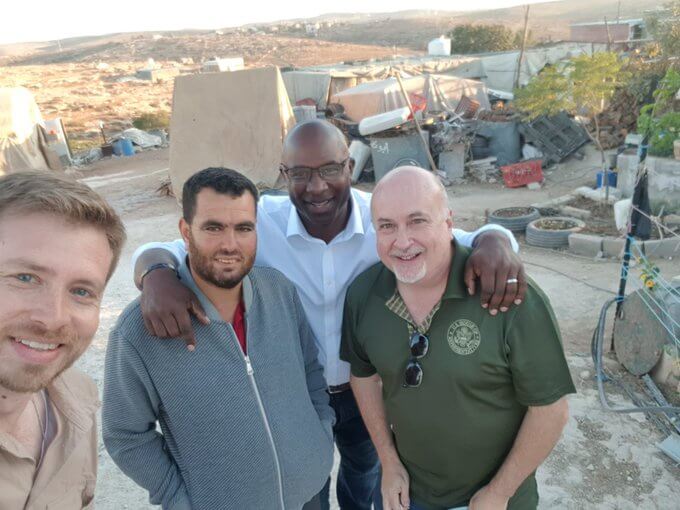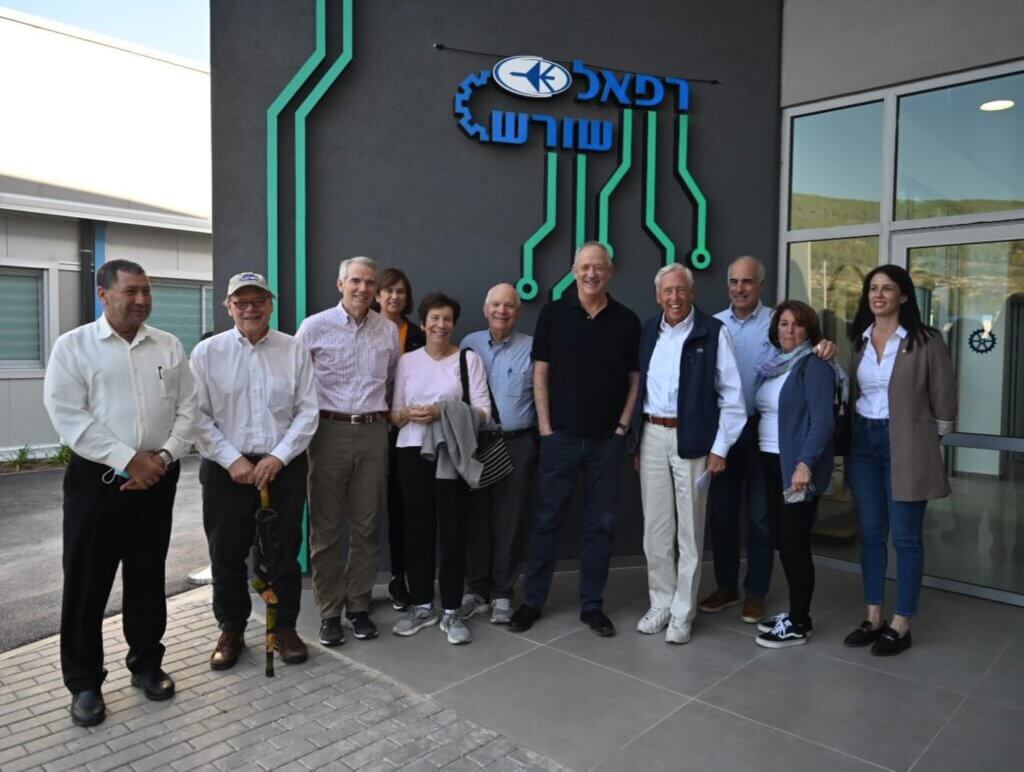In October, Israel moved to ban six leading Palestinian human rights and civil society groups for supposed links to terrorism, and the liberal Zionist organization J Street joined a chorus of international condemnation. J Street issued a statement rejecting the Israeli designation as “deeply repressive and unfounded… totally unacceptable and anti-democratic” and typical of “authoritarian” regimes.
Then in November, the Israel lobby group took a delegation of at least six Members of Congress to Israel and Palestine and met with several Palestinian civil society and human rights groups— but none of the six designated groups. On that five-day trip, the J Street delegation was briefed by Israeli government officials about the “secret evidence” in support of the terrorist designation, a source who was not on the trip tells me. Rep. Rosa DeLauro’s disclosure statement from the trip supports that assertion: She says the delegation received “briefings on Israel security” from “senior” government officials.
I asked J Street whether the delegation heard the secret supposed evidence, but it did not respond to my questions.
The trip itinerary shows that J Street met with two ministers who have vociferously defended the claim: Prime Minister Naftali Bennett and Foreign Minister Yair Lapid. It also met with rightwing Interior Minister Gideon Sa’ar, who has also vouched for the designation, saying it “was made on a legal and factual basis.”
Shouldn’t J Street delegation have heard from the Palestinian groups on this matter?
The trip included at least six Congresspeople, all Democrats and of a progressive stripe: DeLauro of Connecticut, who is chair of the House Appropriations Committee; Melanie Stansbury of New Mexico; Barbara Lee of California; Jamaal Bowman and Mondaire Jones of NY; and Mark Pocan of Wisconsin.
The delegation was in Israel and Palestine from Nov. 6-11, and its meetings were consistent with earlier J Street trips. It heard from human rights groups from within Israel, such as Gisha, which focuses on freedom of movement for Palestinians; and HaMoked, which has opposed house demolitions; and the anti-occupation veterans’ group, Breaking the Silence.
The J Street delegation’s exposure to Palestinian groups was, as in the past, more circumscribed, including none of the six on the banning list. For instance, it met with Hoqoqona, an NGO that seeks to empower Palestinian women; JEST, which serves entrepreneurs in East Jerusalem; and the Atta’a Assistance Center, which works for the rights of East Jerusalem residents. In Ramallah, the delegation had a session with Palestinian civil society, and the leaders were centrist, including Bashar Azzeh, an entrepreneur, and Mohammad Asideh of a Palestinian dialogue group with the values of “respect, peace and democracy.”

As important and informative as these meetings were, those organizations do not have the prominence inside Palestine of the six groups fingered by Defense Minister Benny Gantz as supposedly “terrorist” in October: Al-Haq, the human rights organization; Addameer, the prisoners’ advocacy organization; Defense of Children-International Palestine; the Bisan Center for Research and Development; the Union of Agricultural Work Committees, and the Union of Women’s Committees.
All six Palestinian organizations earned Israel’s wrath because they have assisted the ICC investigation into possible Israeli and Palestinian war crimes, which include the half century of illegal settlements in the West Bank and the 2014 onslaught on Gaza. Gantz led that war as army chief of staff; he later boasted as a political candidate that he had returned parts of Gaza to the Stone Age.
The terrorism designation has been met with widespread outrage from the human rights community and beyond.
United Nations human rights experts “strongly and unequivocally” condemned the designation as a “frontal attack” on the Palestinian human rights movement. The E.U. has challenged Israel to produce evidence. Nine U.S. congresspeople have sponsored a resolution condemning the designation as “repressive.” (None of those congresspeople were on the J Street trip.) The Israeli human rights attorney Michael Sfard has called the designation an “act of tyranny” and said that the international response to the designation has left the designation “shattered.”
Many Israeli groups, including groups that J Street’s delegation met with on this trip, issued a solidarity statement against the “draconian measure,” and called on “the international community to oppose this decision unequivocally.”
Even members of the Washington establishment have shown support for the Palestinian groups. The Foundation for Middle East Peace held a webinar to air the groups’ voices– one leader called the designation “state terrorism at its finest hour” — and the event gained prominent co-sponsors: Carnegie Endowment for International Peace, Century International, the International Crisis Group, Democracy for the Arab World Now, the Carter Center, and the Middle East Institute.
Human Rights Watch and Amnesty International called on the international community to protect the groups. They issued a joint statement describing the six groups as the “best of global civil society” and deploring the designation as a “brazen” attack on the human rights movement.
For decades, Israeli authorities have systematically sought to muzzle human rights monitoring and punish those who criticize its repressive rule over Palestinians. While staff members of our organizations have faced deportation and travel bans, Palestinian human rights defenders have always borne the brunt of the repression. This decision is an alarming escalation that threatens to shut down the work of Palestine’s most prominent civil society organizations…
How the international community responds will be a true test of its resolve to protect human rights defenders.
In October, J Street issued a short but strong statement that echoed other condemnations.
Labeling human rights advocates as “terrorists” in order to criminalize their activities is the type of action that we regularly see from authoritarian, illiberal regimes, and is totally inconsistent with democratic values.
J Street urged the Biden administration to get clarification, as it said it would. But after an Israeli delegation came to the State Department to defend the designation behind closed doors, the Biden administration has appeared to sweep the matter under the rug as a headache it does not need when it is trying to revive the Iran deal and prepare for the 2022 election cycle.
J Street has not followed up its original statement with any other statement, and meantime a congressperson closely associated with J Street, Steve Cohen, met with Benny Gantz last month and heard Gantz expatiate on such issues as the threat from Iran and the “unwavering bond between” the U.S. and Israel. Cohen’s delegation included a heavyweight, House Majority leader Steny Hoyer, whose grin during the foto-op was even bigger than Cohen’s.

J Street’s position here seems to mirror that of its Israeli allies, the Labor/Meretz members of the new Israeli government: criticize the designation but then quietly go along with it, lest meaningful opposition would limit its access to powerful officials, or weaken the new Israeli government.
J Street was long on the outs in Israel and even in D.C. During the Obama administration, it was redlined as anti-Israel and worse by the Netanyahu government; and the American Jewish establishment kept it out in the cold. Now it has access and clout inside the Democratic Party. Chuck Schumer and Nancy Pelosi address its gatherings; and to its credit, J Street is spending political capital on important issues like restoring the Iran deal and reopening the U.S. consulate in Jerusalem (often citing the opinions of Israelis).
But J Street has surely gotten the message, from Cohen and Hoyer. If you want access to Israeli leaders, such as Bennett and Lapid, don’t make an issue of the hateful terrorist designation. If you want access to the White House, ditto.

Mondoweiss is a nonprofit news website dedicated to covering the full picture of the struggle for justice in Palestine. Funded almost entirely by our readers, our truth-telling journalism is an essential counterweight to the propaganda that passes for news in mainstream and legacy media.
Our news and analysis is available to everyone – which is why we need your support. Please contribute so that we can continue to raise the voices of those who advocate for the rights of Palestinians to live in dignity and peace.
Support Mondoweiss from as little as $1. Thank you.
 RSS Feed
RSS Feed















 December 3rd, 2021
December 3rd, 2021  Awake Goy
Awake Goy  Posted in
Posted in  Tags:
Tags: 













